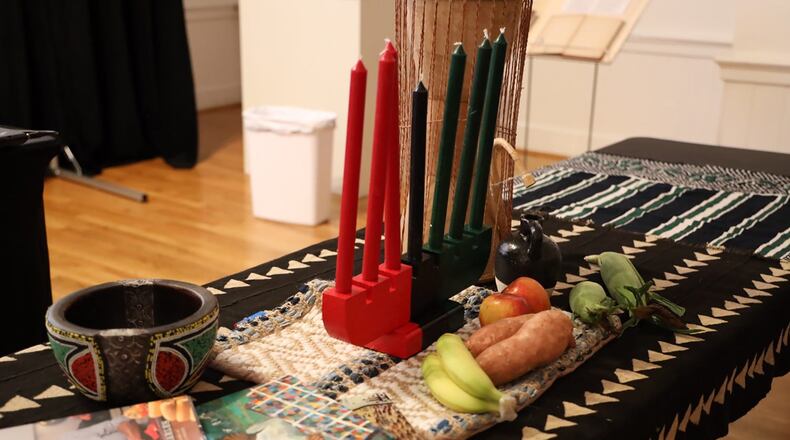Growing up, celebrating Kwanzaa was not only a familiar event for Savannah resident Aquila Rhodes, but one held in high regard in her family.
Her grandmother is Dorothy Cohen, a woman cultural historian Amir Jamal Touré affectionately calls the “Queen mother of Kwanzaa,” and rightfully so. Kwanzaa has been observed in Savannah since 1987 under Cohen’s guidance.
Credit: File Photo
Credit: File Photo
Every year from Dec. 26 to Jan. 1, Rhodes, 30, could look forward to gifts, a big feast, and the lighting of a candle — held by the seven-branched candleholder called a kinara — to signify each of the seven principles of the African American and Pan-African holiday that celebrates family, community and culture.
Kwanzaa was founded in 1966 by Black activist and scholar Maulana Karenga as a way for African Americans to get in touch with their African roots and embrace their culture. It was considered a mainstream holiday in the 1980s during the Black Power movement, a time that emphasized racial pride, economic empowerment and the creation of political and cultural institutions. However, reports have suggested less fanfare and a declining popularity when it comes to the secular holiday.
Credit: Courtesy of Aquila Rhodes
Credit: Courtesy of Aquila Rhodes
Despite these reports, the traditions of Kwanzaa are still very much alive and evolving as those who have pioneered the holiday pass the torch to the younger generation in Savannah.
Along with her cousin, Rhodes helped her grandmother with background things like setting up. Even as a young child, it showed her the significance of the proverb "it takes a village," and the Kwanzaa principle of Umoja (Unity) became a longstanding favorite.
Now a second-grade teacher and a mother, Rhodes has worked to pass on the traditions of Kwanzaa to her students and daughter.
“I took my daughter when she was months old. I have pictures of her playing the drums and she loved the music,” Rhodes said. “For her, it was kind of like a family that she didn't really know, yet. It's still really a comfort just being at a Kwanzaa celebration, and I could see it with her, as well.”
Lillian Grant-Baptiste, a local inspirational speaker, worked with young people through a Rites of Passage program in public housing that taught them about self determination, the importance of history, culture, and understanding who they are. The program was based on the seven principles of Kwanzaa, and what she observed was that it was very new for most of the students.
She said the interest for Black youth comes from tradition and self-determination.
Credit: Nick Robertson / SavannahNow.com
Credit: Nick Robertson / SavannahNow.com
“I think some of it is through family tradition, and then some of it was through just wanting to do something different, wanting to walk in their own path and learning about who they are and going deeper into who they are and their culture and history,” Grant-Baptiste said.
For Brandy Simpkins, 23, Grant-Baptiste’s sentiments ring true. She grew up celebrating Christmas in her household and rarely heard Kwanzaa mentioned in her community. It landed in the same vein as Hanukkah — a holiday she casually heard about for years but didn’t have a true understanding of. It wasn’t until she attended Savannah State University, a historically Black university, that the holiday was given more emphasis.
“When I learned that Kwanzaa was a Pan-African and African American celebration, I felt like it was very important for me to celebrate these new traditions,” Simpkins said. “I feel like it's important for African Americans to have their own traditions in the United States, so when I found out that that was being built out through that holiday, I definitely wanted to participate.”
Credit: I Am Candid Photography
Credit: I Am Candid Photography
That interest in participating has influenced Simpkins to perform poetry at The Beach Institute's virtual Kwanzaa observation this year. And while she said she doesn't personally know anyone her age who celebrates the holiday faithfully, the cultural respect is present, evident by her peers who attend Kwanzaa events in the community even if they don't participate.
"Black youth should celebrate themselves regardless. So, rather that comes out in them celebrating Kwanzaa, wearing dashiki, wearing their athletes out, etc.," Simpkins said. "I just feel that we should find ways to honor ourselves, and if they find that Kwanzaa is a good way to do that, then I definitely encourage it."
Laura Nwogu is the quality of life reporter for Savannah Morning News. Contact her at lnwogu@gannett.com. Twitter: @lauranwogu_
This article originally appeared on Savannah Morning News: Generation Kwanzaa: Black youth continue to embrace the traditions of the cultural holiday
The Latest
Featured






